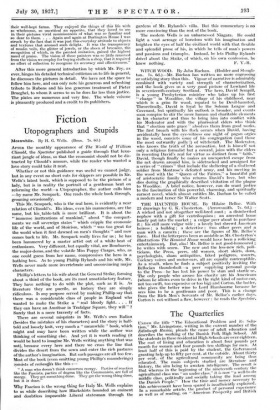Fiction.
Utopographers and Stupids
Meanwhile. By H. G. Wells. (Bann. 7s. 6d.)
AFTER the monthly appearance of The World of William Clissold, the Spectator published a guide through that luxu- riant jungle of ideas, so that the economist should not be dis- tracted by Clissold's amours, while the reader who wanted a love story could take it neat.
Whether or not this guidance was useful we cannot judge, but in any event no short cuts for skippers are possible in Mr. Wells's latest book, which is supposed to be the picture of a lady, but is in reality the portrait of a gentleman bent on reforming the world—a Utopographer, the author calls him —by name Mr. Sempack. One reads the whole book through, groaning occasionally.
This Mr. Sempack, who is the real hero, is evidently a near relation of Clissold's. His ideas, even his mannerisms, are the same, but his table-talk is more brilliant. It is about the " immense inattentions of mankind," about " the compart- ments we call sovereign states " which cripple the economic life of the world, and of Stoicism, which " was too great for the world when it first dawned on men's thoughts " and now comes back to life. Mr. Sempack really lives for us ; he has been hammered by a master artist out of a white heat of enthusiasm. Very different, but equally vital, are Bombaceio, the major-domo, and the volatile Miss Puppy Clarges, who, as one could guess from her name, compromises the hero in a bathing box. As to young Phillip Rylands and his wife, Mr. Wells never made more invertebrate and unconvincing major characters.
Phillip's letters to his wife about the General Strike, forming about a third of the book, are its most unsatisfactory feature. They have nothing to do with the plot, such as it is. As literature they are puerile, as history they are simply ridiculous. Is any purpose served by making Phillip say that there was a considerable class of people in England who wanted to make the Strike a " real bloody fight. . . . If they can have an Amritsar in Trafalgar Square, they will " ? Surely that is a mere travesty of facts.
There are several misprints in Mr. Wells's own Italian (besides the mistakes of his characters) and the story is half- told and loosely knit, very much a " meanwhile " book, which might and may have been written while the author was thinking of something else. And yet it is worth reading (it would be hard to imagine Mr. Wells writing anything that was not), because every here and there we cross the line that divides the desert from the sown and enter the rich pastures of the author's imagination. But such passages are all too few. Most of the book (even omitting young Phillip's maunderings)
consists of reehauffes like this :- " A man who doesn't think conserves energy. Parties of reaction like the Fascists, parties of dogma like the Communists, are full of energy. They get something done. They get the wrong thing done, but it is done."
Why Fascism is the wrong thing for Italy Mr. Wells explains to us while describing how Blackshirts hounded an eminent
and doubtless impeccable Liberal statesman through the gardens of Mr. Rylands's villa. But this commentary is no more convincing than the rest of the. book.
The modem Wells is an unharnessed Niagara. He could light a vast acreage of boredom with his imagination and brighten the eyes of half the civilized world with that flexible and splendid prose of his, in which he tells of man's powers and passions and triumphs. Instead, he lets Phillip Rylands drivel about the Strike, of which, on his own confession, he


































 Previous page
Previous page